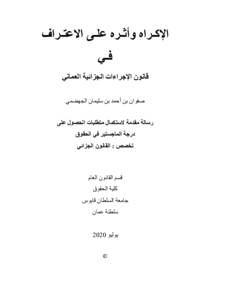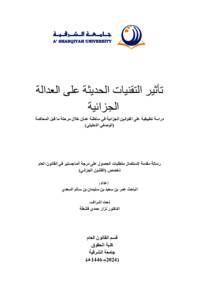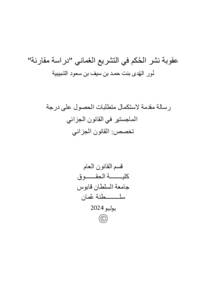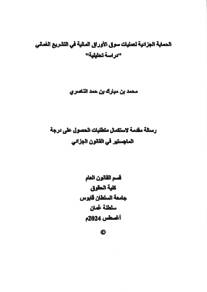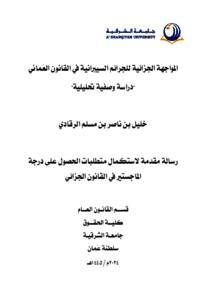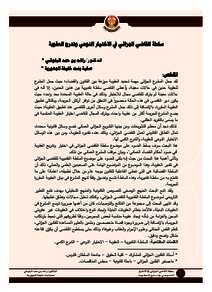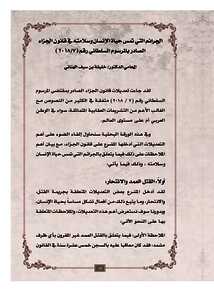Document
الإكـراه وأثـره علـى الاعتـراف فـي قانون الإجراءات الجزائية العماني.
Other titles
The Duress And Its Effect On The Confession In Omani Criminal Procedures Code
Publisher
جامعة السلطان قابوس.
Gregorian
2020
Language
Arabic
English abstract
Many of the legislations have stated that the criminal judge has the absolute
authority to prove the legal validity of the evidences to ascertain the veracity of
those evidences. One of the major flaw that can annul the validity of those
evidences is when it is obtained under duress. In the introduction of this paper the
researcher was trying to raise an important issue in this context which was
represented by the following question: What is the impact of duress on the
confession in the Omani criminal code? In order to solve the raised issue, the
researcher utilize the descriptive analytical method throughout his paper, initially
he elucidates the definition of confession as a one of the evidences in the criminal
case. Then he explains the conditions to ensure the validity of any confession.
Accordingly, he also explores the duress that forces the accused to confess against
his will which consider as a reason to annul his confession since it breaches one of
the conditions of valid confession which is the autonomy, therefore, the decision
to grant the validity of such confession is made at the discretion of the court, which
in turn decide whether to take that confession fully, partially or to completely reject
the confession in the case. One of the cardinal results that the researcher attain from
his paper is : The judicial confession can be considered as an evidence itself and
consequently can be used as a verdict of guilty, and the reason to keep the
confession under the estimate of the judge is only to ensure the practical validity of
this evidence. All of that was mentioned clearly in the Article 191 of the criminal
procedure law of the Omani criminal code which stipulated that the judicial
confession is enough to judge based on it without the need for further evidence.
Likewise, the modern pictures of duress considered as illegal even though there are
no legislations to accuse it since it acts against the accused desire or will. As to the
recommendations that the researcher came with in his paper, He recommend that,
the legislations need to give the accused the right of self-defense in case he faced
any risk from the authority during the investigations. In addition, the absolute
criminal judge authority in the estimation of the evidences need to be restricted to
meet the jurisprudence regulations. Moreover, the law needs to state clearly in the
admissibility of taking confessions that deny the fault or the responsibility.
Member of
Resource URL
Arabic abstract
لقد نصت أغلب التشريعات بأن للقاضي الجزائي الحرية المطلقة في وزن الأدلة وتقدير قيمتها القانونية النظر إلى صحتها وسلامتها، ومن أهم ما يبطل هذا الدليل هو صدوره تحت الإكراه، وفي مقدمة الدراسة يطرح الباحث إشكالية تمثلت في السؤال التالي: ما هو أثر الإكراه على الاعتراف في قانون الإجراءات الجزائية العماني؟ ولقد استعان الباحث في حل المشكلة المطروحة عن طريق المنهج الوصفي، فبين من خلال البحث مفهوم الاعتراف باعتباره أحد أدلة الإثبات في الدعوى الجزائية، وما هي شروط صحة الاعتراف وحجيته في الإثبات، وعليه تطرق البحث إلى موضوع الإكراه والذي يعدم إرادة المتهم للقول بما لم يرده، وهو أحد أسباب بطلان الاعتراف كونها تُفقد الاعتراف أحد شروط صحته وهو شرط الإرادة، وبالتالي فإن القول ببطلان الاعتراف من عدمه يدخل تحت سلطة محكمة الموضوع التقديرية والتي بدورها تقدر الاعتراف سواء بالأخذ به كليا أو تجزئته أو إهدار قيمته في الاستدلال. ومن أهم النتائج التي توصل إليها الباحث: أن الاعتراف القضائي بنفسه حجة ويمكن الحكم بالإدانة بناء عليه وحده، وأن جعل الاعتراف يخضع لتقدير قاضي الموضوع هو للتأكد من صحة وصدق الاعتراف من الناحية الواقعية، أيضا حسنا فعل المشرع العماني في نص المادة 191 من قانون الإجراءات الجزائية حينما نص على كفاية الاعتراف القضائي للحكم بناء عليه دون أن تسانده أية أدلة، كذلك فإن الصور الحديثة للإكراه هي وسائل غير مشروعة حتى ولو لم تنص عليها التشريعات كونها تعدم إرادة المتهم، أما أهم التوصيات التي خرج بها الباحث هي: أن ينص المشرع على حالة الدفاع الشرعي ليستفيد منها المتهم في حالة تعرضه للخطر الحال من قبل رجال السلطة، وأن تقييد سلطة القاضي الجزائي المطلقة في تقدير الأدلة عموما بالضوابط التي وضعها الفقه، وأن ينص المشرع على عدم جواز الأخذ بالاعتراف النافي للخطأ أو المسؤولية صراحة في مواد القانون.
Category
Theses and Dissertations

